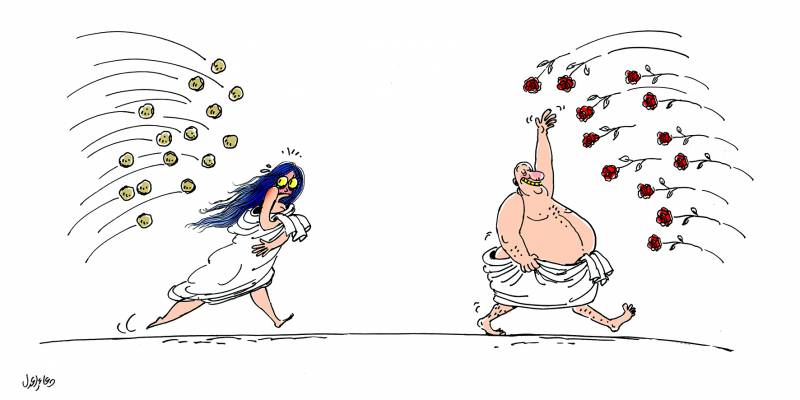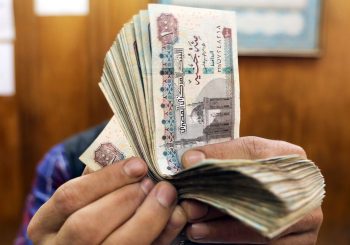While Cartoon is a form of art that addresses children through simple drawings and clear dialogue, it could function as the perfect medium for adults to tackle some of the most complicated and controversial issues.
As many websites continue to suffer from the blockade, alternative methods of expression contribute to progress the political and social dialogues. From 24 May till now, 130 websites have been blocked preventing readers in Egypt from accessing online news websites, according to Association for Freedom of Thought and Expression (AFTE).
Not only does the blockade cripple the freedom of the press, but also it is considered unconstitutional as it violates Article 57 stipulating the public’s right to know and to access information.
Moreover, critics and opponents of the governments have continued to suffer from arbitrary arrests and detentions, forced disappearances, imprisonments and acts of torture.
Egyptian cartoonists are no exception; Islam Gawish who is known for his satirical slant on political issues was arrested earlier in January 2016 for allegedly “running a website without a license”.
Gawish publishes his work on the Facebook page “elwarka” – or a sheet of paper – which is followed by more than two million people. His satirical cartoons are generally dedicated to societal and political issues with relevance to the Egyptian politicians.
Despite his release with no charges, activists had said his arrest targeted freedom of opinion and expression.
Egypt is the second worst jailer of journalists in the world in 2016, clocking in after China, according to the Committee to Protect Journalists (CPJ).
“Two weeks after the block and we still don’t know who’s behind it or why it happened,” says Mada Masr in a Facebook post.
“There are two kinds of cartoons, the social and political cartoons,” says Guyer
The political cartoons could tackle local politics, foreign policy issues or political characters and statements. While political cartoon does infuse laughter, the content is no laughing matter. Political cartoon functions as a tool to inform and provoke the public.
“The best cartoon forces the reader to think and evaluate so I would say that the most effective cartoon is the one that challenges the reader,” adds Guyer.
Guyer further explains that a lot of times in crises cartoonists have a choice; they can either reinforce the narrative or show the bigger picture.
“The cartoons I am more interested in are the ones that show the inter-Arab struggles,” adds Guyer. He describes an illustration by Cartoonist Anwar published in Al Masry Al Youm newspaper showing an explosion on a canvas in reference to the “Arab-Arab Relation”.
“The social cartoon tackles issues like oil and sugar prices or currency inflation; it focuses on the Egyptian character or local personalities,” adds Guyer.
Moving on to the social cartoon, Egyptian Cartoonist Doaa Al Adl has launched her first book “50 Caricatures and More on Women”.
The book is into three section; the first one is about challenges women face in their day-to-day lives. The second section is about laws and discriminates against women. The third section leaves the readers with positive images that empower women and liberates them from their chains.
Egypt has enjoyed a historical duo Mustafa Amine and Ahmad Ragab who helped shape the caricature art scene in Egypt. The Egyptian cartoonists created and published many cartoons in state-owned Akhbar Al Youm. Readers looked forward to their contributions making fun of official statements, decisions.
Cartoonists used to address topics like taxes, government censorship, hikes in prices as women, but never really address women issues.
“I decided to work on such book because, throughout the history of caricature art in Egypt and the Arab world, there is no representation of women nor her problems. I decided to fill in the gap,” Al Adl says.
Al Adl continues “when I first started drawing caricature art, I received feedback to use text on my art work. However, I wanted to propose a new approach to caricature art and let the art stand alone with no text.”
Al Adl adds that, through the book, she addresses social and economic struggles that are it women face in the society. Crime honors, rape, child marriage, Female Genital Mutilation (FGM) in addition to laws concerning women are illustrated in detail in the book.
“Despite the Constitutional Court issuing a decree in the year 2000, granting women the right to travel without prior permission from her father or husband; the right can be restricted by a male family member applying for a court decision to be issued to prevent her from travelling, by virtue of the provisions of the Personal Status Law No. 1 of the year 2000,” stated in the book.
Another legal issue discussed in the book is child marriage.
“Despite the wide spread of marriage of minors in impoverished villages, where young girls many wealthy Arabs of foreigners for a short period then get divorced, the government did not combat this phenomenon. Rather in the year 2015, the government amended the law on marriage to a foreign husband, such husband shall pay a sum of 50,000 pounds to the Egyptian wife, if he is 25 years older than the wife at the time of registering the marriage contract.”
It further discusses how the Egyptian Penal Code discriminates between women in dealing with the crime of adultery.
“A man is only accused of the crime if he is found in the marital dwelling with another woman (other than his wife). However, a wife who is proved to have committed the crime of adultery shall be sentenced to a period of imprisonment not exceeding two years; however, the husband may suspend the execution of the sentence,” stated in the book. It further explains that the wife has no right to suspend the sentence according to Articles 274 and 277 of The Egyptian Penal Code.
It further explains that the wife has no right to suspend the sentence according to Articles 274 and 277 of The Egyptian Penal Code.
“In some poor villages and Upper Egypt, low-income families still prefer educating their sons to their daughters,” one of the social problems stated in the book.
“To be as she may please!” Al Adl concludes her book and the interview with Egyptian Streets.










Comments (0)